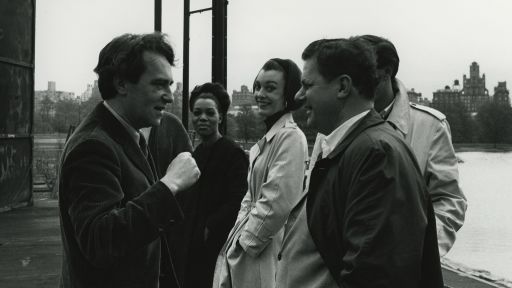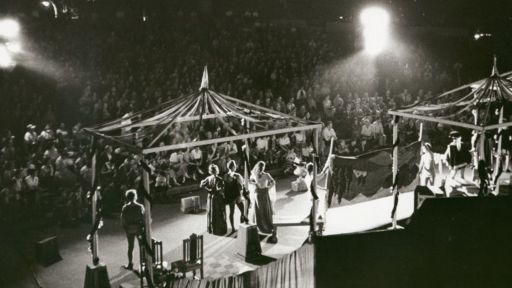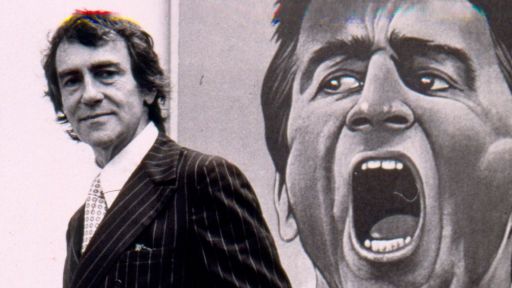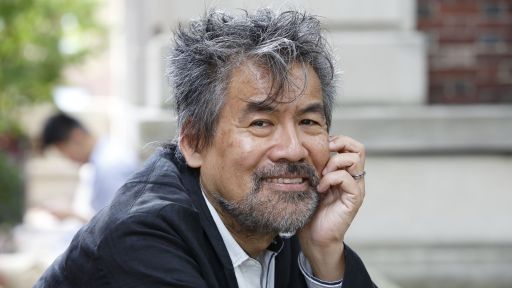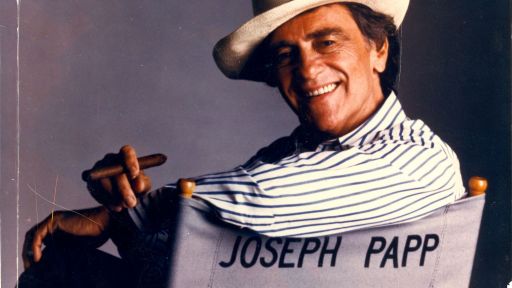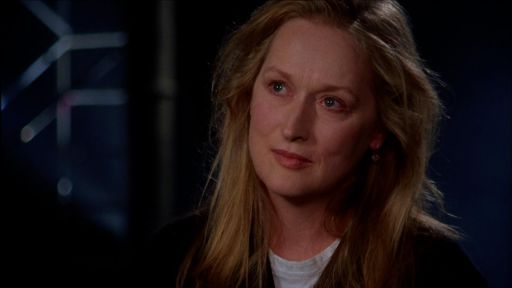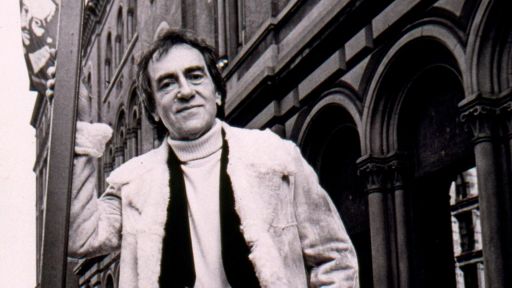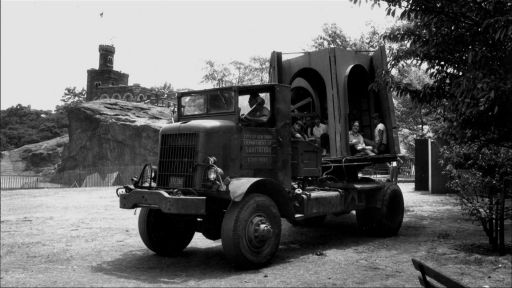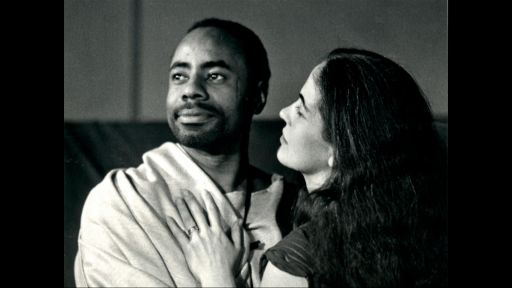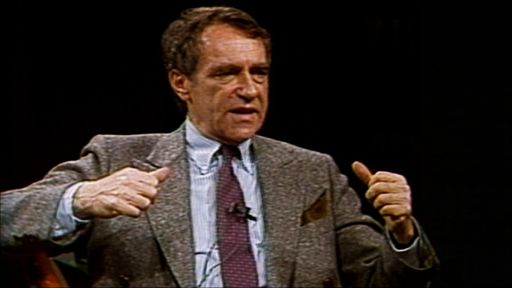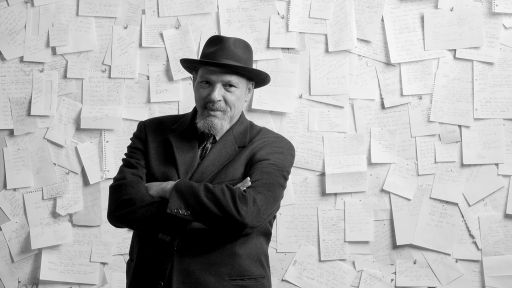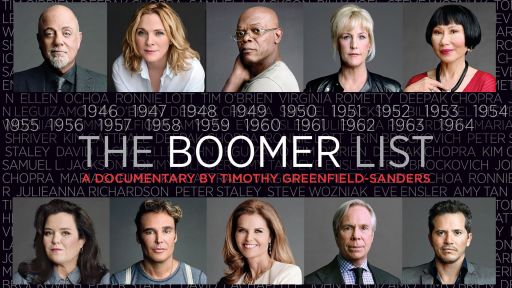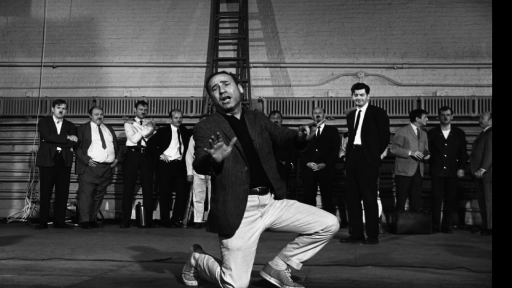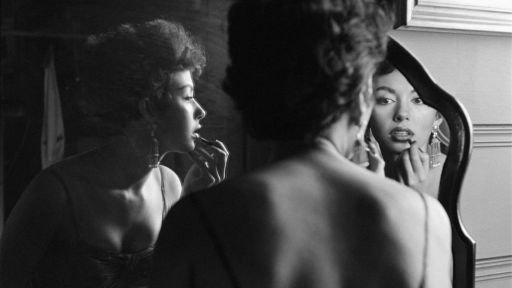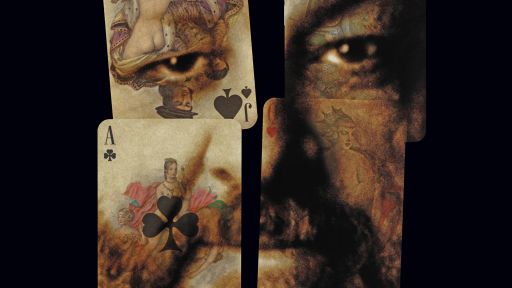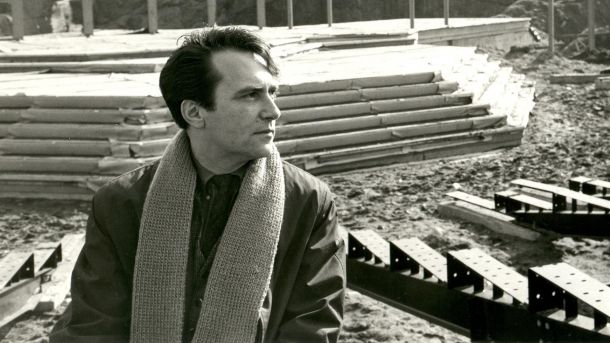 From 1954 until his death in 1991, Joe Papp brought more theater to more people than any other producer in history. In his eyes, art was for everyone, not just a privileged few. “We have public libraries,” he would argue, “Why not public theaters?” Papp recognized the role art could play in building a more democratic, inclusive society. He was convinced that women and minorities, denied power elsewhere in society, could develop it on the stage.
From 1954 until his death in 1991, Joe Papp brought more theater to more people than any other producer in history. In his eyes, art was for everyone, not just a privileged few. “We have public libraries,” he would argue, “Why not public theaters?” Papp recognized the role art could play in building a more democratic, inclusive society. He was convinced that women and minorities, denied power elsewhere in society, could develop it on the stage.
Over the course of a 40-year career, Joe Papp’s productions won 28 Tony Awards, 96 Obies (the Off-Broadway alternative to the Tonys), 29 Drama Desk Awards, six New York Drama Critics Awards and three Pulitzer Prizes. Here is an extensive timeline of the milestones and achievements in the life of Joseph “Joe” Papp.
Born Yussel Papirofsky on June 22nd to Shmuel and Yetta Papirofsky in Williamsburg, Brooklyn. Joe Papp’s mother left Kovno, Lithuania as a fifteen year-old orphan. His father left Kielce, Poland at age twenty to escape conscription into the army. Papp was the oldest of four children (Rhoda, Joe, Philip and Rose). Yiddish was his first language.
Graduates from Eastern District High School. By this time, Papp is an active member of the Young Communist League. According to Papp, “It was clear to me that there were two classes, the haves and have nots, the rich and the poor. For me it was not an intellectual matter. I was one of the poorest kids in my high school class.”
At age twenty, Papp marries Betty Ball, an Othodox Jewish woman from his neighborhood who would give birth to a daughter, Susan, Papp’s first child.
Joe Papp in World War II
Having experienced anti-Semitism first-hand as a kid, Papp joins the U.S. Navel Reserves during WWII, determined to fight Hitler and fascism. “To me, intolerance is a greater threat than poverty,” he would later state. While stationed at Bainbridge Naval Base in Maryland, Papp meets Irene Ball, a WAVE. Their romance would last two years and result in the birth of a daughter, Barbara, whose existence he would not learn about until thirty-five years later. Papp would spend the duration of the war stationed on an aircraft carrier, the U.S.S. Solomons, in the South Pacific. “If there hadn’t been a war, I would never have wound up in theater,” Papp said of his experience in the Navy where he began staging vaudeville sketches for his fellow sailors to pass the time. Eventually Papp would become part of an “entertainment” unit that would perform for the troops. It was during this time that Papp met a young sailer, Bob Fosse, who he took under his wing, acting as a mentor and giving the young Fosse his first exposure to theater. Upon his release from the Navy in 1946, Papp and his first wife, Betty, get divorced.
Joe Papp moves to Los Angeles
Thanks to the G.I. Bill passed in 1944 to provide benefits including paid tution for veterans returning from WWII, Papp moves to Los Angeles to study acting and directing at the Actors' Lab in Hollywood. Most members of the Actors' Lab were left-leaning politically; several were members of the Communist Party. Papp, an aspiring actor, discovers his talents as a producer during his time at the Lab. Eventually he would become the company's Stage Manager. While at the Lab, Papp would meet and marry Sylvia Ostroff, whose parent’s like Papp’s, were Jewish immigrants. By this time, Papp had begun actively concealing his Jewish identity, instead telling his new bride that his father was Russian and his mother was British and had tea every afternoon served on a silver tray. In 1948, the couple would become parents of a son, Michael.
The FBI opens a file on Papp
Amidst the growing tensions of the Cold War, in 1947, President Harry Truman signed Executive Order 9835 creating an official list of “subversive” organizations, while two million federal employees were required to sign a loyalty oath. By 1948, the Actor’s Lab had become the target of the Tenney Committee, the California version of the House Un-American Activities Committee, and collapsed under the pressure. The L.A. Bureau of the FBI begins to track Papp’s activities and maintain an active file on his whereabouts.
Tours the country as Assistant stage Manager and Understudy (Biff) with the National Company's "Death of a Salesman." During the tour, Papp would meet Peggy Bennion, daughter of a Mormon Bishop from Utah, an aspiring actress who had a small role in the play. The two would begin a romance and a year later, they would marry. As a condition for agreeing to divorce Papp, Sylvia insists he give up all rights to see his son which, however reluctantly, he did.
The beginning of Papp's "non-traditional casting"
Directs three one-act plays by Sean O'Casey at Yugoslav-American Hall in NY while working as the stage manager for CBS's "Studio One" and "I've Got A Secret." In addition to Irish actors, Papp cast several African-American actors, including the distinguished actor William Marshall, as Irishmen. This would mark the beginning one of Papp’s most enduring legacies – interracial casting, more commonly known as non-traditional casting. The production was panned by the then Chief Drama Critic for the New York Times, Brooks Atkinson. The scathing review led Papp to fleetingly consider getting out of theater.
Establishes the Shakespeare Workshop in the basement of the Emmanuel Presbyterian Church on Manhattan's Lower East Side.
Presents the Shakespeare Workshop's first production, "An Evening With Shakespeare and Marlowe." The workshop is granted a provisional charter from the New York State Board of Regents "to encourage and cultivate interest in poetic drama with an emphasis on the works of William Shakespeare and his Elizabethan contemporaries and to establish an annual Shakespeare Festival.”
Stages his first full production, "As You Like It."
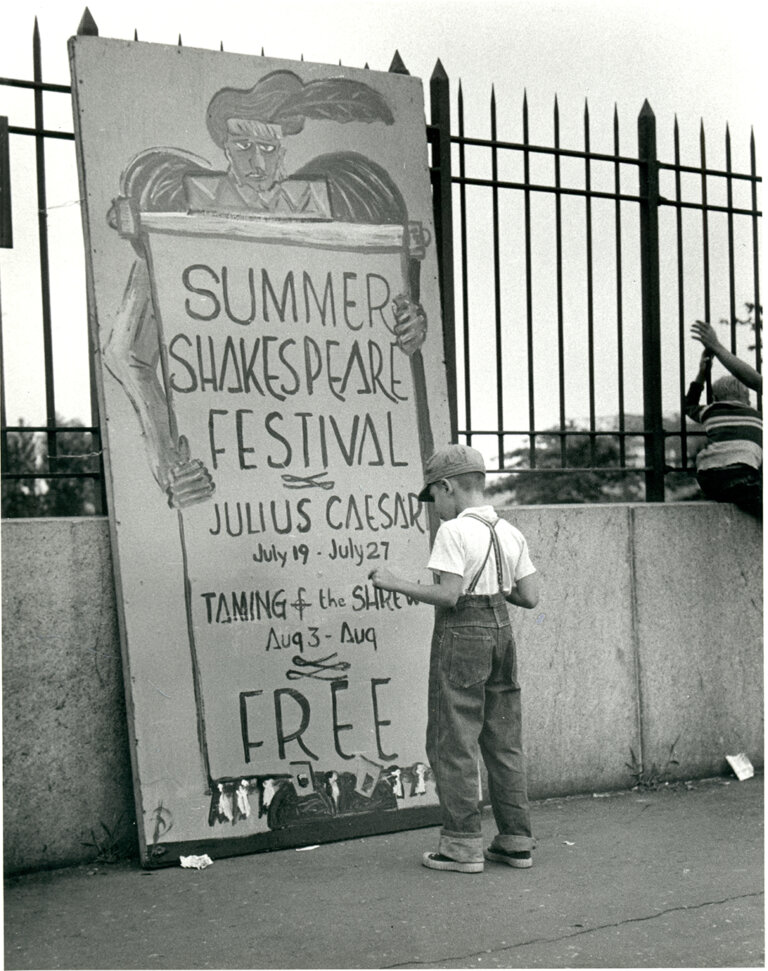
The beginning of Free Shakespeare in the Park
Produces the first summer series of free outdoor performances at the East River Amphitheater on the Lower East Side of New York City. The program includes "Julius Caesar" and "The Taming of the Shrew" (featuring the young, unknown actress, Colleen Dewhurst).
Creates the Mobile Theater, a retrofitted sanitation truck donated by the City of New York which visit neighborhoods throughout New York City’s five boroughs – Brooklyn, Queens, Manhattan, Staten Island and the Bronx – and transforms into a theater that can seat 2,200 people. Romeo and Juliet is the first mobile theater production. Begins second summer of outdoor performances. When the truck breaks down on the shores of Belvedere Lake in Central Park, free Shakespeare in the Park, a beloved New York tradition, is born. Moves his operation uptown to the Heckscher Theater in the fall. This space, donated rent-free by the City, today houses the El Museo del Barrio on Fifth Avenue. Casts an unknown actor, George C. Scott, as Richard III in the second play at the Hecksher. James Earl Jones who would eventually play opposite George C. Scott several years later in Central Park was in the audience and was mesmerized by Scott’s performance as Richard. Papp receives his first Obie Award "for bringing Shakespeare back to life ... with almost no budget."
Testifying at the HUAC hearings
Called to testify before the House Committee on Un-American Activity (HUAC). Takes the Fifth Amendment twelve times. Though willing to answer questions about his own political activities, Papp was unwilling to name names or answer questions about others. Once a witness affirmatively answered any question about his/her own communist activities, he/she forfeited the right to refuse to name names which is why Papp and many other chose to plead the Fifth. Fired from CBS immediately following his HUAC appearance. Papp gets his union, the Radio and Television Director’s Guild, to fight his dismissal, a first for the union. In November, the case is settled in Papp’s favor. After a few months back on the job, Papp quits at which point he decides to devote his full energies to the Shakespeare Workshop.
Robert Moses vs. Joe Papp
Joe Papp pitches a battle with Parks Commissioner Robert Moses who seeks to end free admission to performances in the park. After two successful free seasons of plays in the park, Moses claims that theater goers trample the grass and Papp should charge admission to pay to have the grass replanted. A group of citizens with the support of actress Helen Hayes, launches the “We Want Will Committee,” as public support for Papp and the idea of free Shakespeare begins to grow. Eventually it’s revealed that the real reason behind Moses’ attempt to force Papp to charge admission to his Shakespeare productions is Papp’s political past which becomes clear when Moses leaks word to the press that Papp is a Communist. After losing in the court of popular opinion, Moses who initially wins in court, loses on an appeal. Judge J. McNally rules that the Park Commissioner acted in a manner considered “arbitrary, capricious and unreasonable.” This victory catapults Papp into the public limelight and launches the NY Shakespeare Festival as a major cultural institution. Following the court’s ruling in Papp’s favor, Robert Moses requests funds from NYC’s Board of Estimate (governmental body previously responsible for budget and land-use decisions) to build a Shakespeare-style amphitheater in Central Park.
Granted a permanent charter by the New York State Board of Regents. The Shakespeare Festival is renamed the New York Shakespeare Festival (NYSF).
The Delacorte opens
Opening of the Delacorte amphitheater in Central Park, the permanent home for Free Shakespeare in the Park. Papp chose "The Merchant of Venice" (starring George C. Scott and James Earl Jones) to inaugurate the new theater, but is caught off-guard when the production leads to an unexpected controversy by a group of Rabbis who object to the play, which they consider anti-Semitic. When the Rabbis threaten to boycott the production, Papp comes forward and publicly reveals his own Jewish identity and states that he would never do anything he thought would harm his own people. For many of Papp’s closest associates, it comes as a complete surprise to learn that Papp himself is Jewish, a part of his identity he concealed for much of his life.
Starting The Public theater
Purchases the landmark Astor Library, New York City's first free public library, as the permanent home of the New York Shakespeare Festival. The Astor Library opened its doors in 1854. In 1921, the building was purchased by the Hebrew Immigrant Aid Society (HIAS). During the Depression, it functioned as a soup kitchen but after WWII it became a sanctuary for displaced Holocaust survivors. By 1965, the building had fallen into disrepair. Slated for demolition, Papp joins forces with the newly created Landmarks Preservation Commission to save the building which is designated as one of the city’s first landmarks. Architecture critic Ada Louise Huxtable called it “the miracle on Lafayette Street.” Names his new theater, The Public (after the Public Library), and expands the NYSF mission to include contemporary works by American playwrights.
The beginnings of "Hair"
Inaugurates the New York Shakespeare Festival's Public Theater with the "tribal rock musical, "Hair." The original production had no nudity and was not well received. The following year, the playwrights allow novice theater producer Michael Butler to add nudity and transfer the play to Broadway where it becomes an instant hit. As part of the original contract, Papp’s NYSF receives 1.5% of the gross profits and 10% of the subsidiary rights. The success of "Hair" opens Papp’s eyes to the potential financial success that could be made on Broadway.
Stages "The Memorandum" by Czech dissident writer, Vaclav Havel, beginning a relationship that was to continue throughout his life. Havel was in prison in Czechoslavakia as a political dissident when Papp staged "The Memorandum" which was named Best Foreign Play of the Year. Though Papp offered to obtain a Visa for Havel to come to the U.S., Havel refused believing his imprisonment did more to undermine the credibility of the Communist regime than his freedom could achieve. Opens the doors of the Public Theater to young playwrights to encourage the creation of contemporary American works. Gives writers a place to develop their talents in a series of workshops employing actors which becomes known as POP, Playwrights on Payroll.
Joe Papp accepts invitation to take over the management of Lincoln Center's two theaters, the Vivian Beaumont and the Forum (renamed the Mitzi Newhouse), establishing an uptown base for his productions. Opens Lincoln Center season with "In the Boom Boom Room" by David Rabe. NYSF contracts with CBS-TV to produce "Much Ado About Nothing" and other productions. Pulitzer Prize and Tony Award for That Championship Season.
Transfers "A Chorus Line" to Broadway after an initial run at The Public Theater.
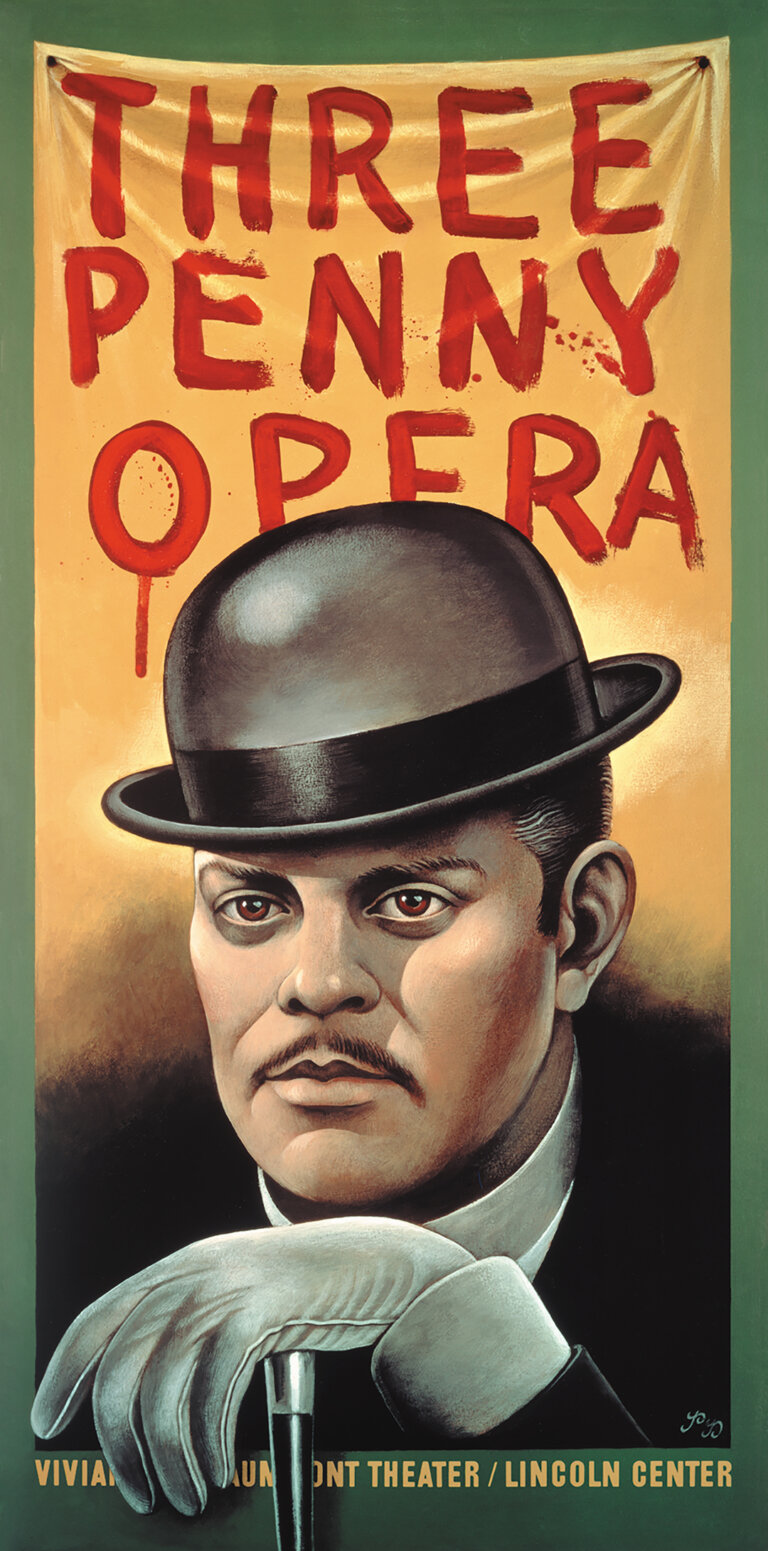
A big year for Joe Papp
In a landmark year, Joe Papp produces three major productions simultaneously: "For Colored Girls Who Have Considered Suicide When the Rainbow Is Enuf" on Broadway, "Three Penny Opera" at the Vivian Beaumont and "Streamers" at the Mitzi Newhouse. Establishes the Festival Latino. Quits post at Lincoln Center which he refers to has his “strategic retreat forward.” Marries Gail Merrifield Papp.
Papp stages Larry Kramer's controversial play, "The Normal Heart," the first major play to address the issue of AIDS.
Announces the Shakespeare Marathon, a six year program to present all thirty-seven of Shakespeare's plays. "A Midsummer Night's Dream" opens the series. Joe Papp is diagnosed with prostate cancer. Papp's son, Tony Papp, is diagnosed as HIV positive.
Papp directs Bill Gunn's Forbidden City, the last of the forty-five plays he will direct for the Shakespeare Festival .
"A Chorus Line" closes. The show, the longest running musical in the history of Broadway at the time, earned $38.8 million for the Festival. Rejects a grant of $323,000 from the National Endowment for the Arts, after refusing to sign a mandatory government-mandated, anti-obscenity clause. Papp steps into the fray over public funding of the arts. In the process, he becomes one of the most vocal and outspoken champions of public funding and free speech in the face of conservative Congressional attempts to defund this governmental agency.
Appoints Joanne Akalaitis head of the New York Shakespeare Festival and steps down on August 21st. On June 1st, Tony Papp dies of AIDS. On October 31st, Joe Papp dies of prostate cancer at his home in Greenwich Village.

